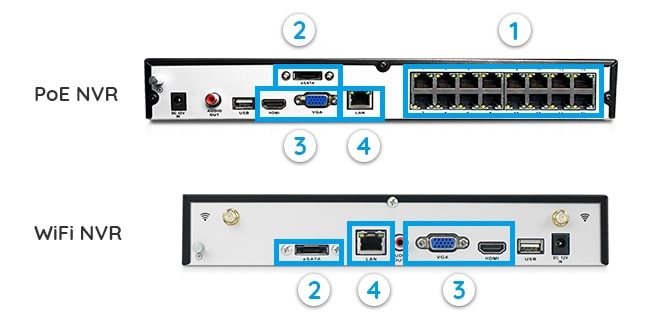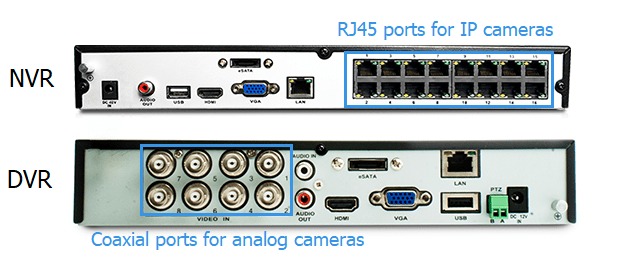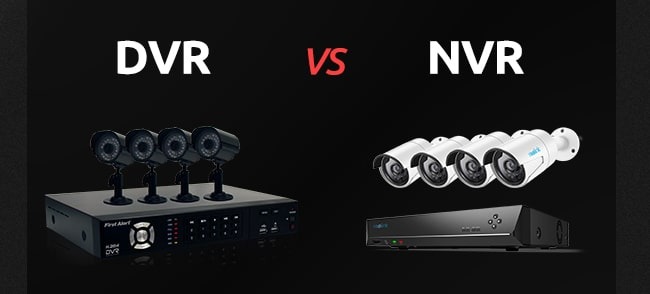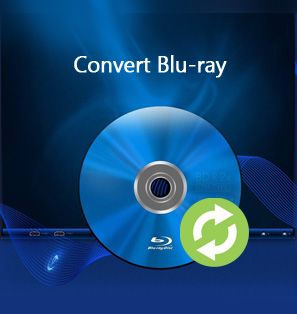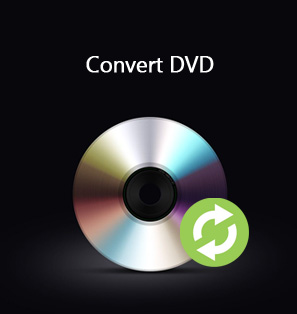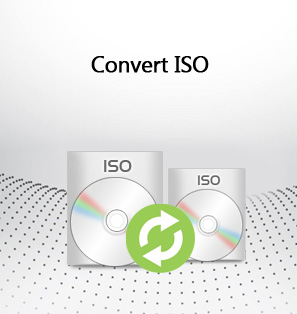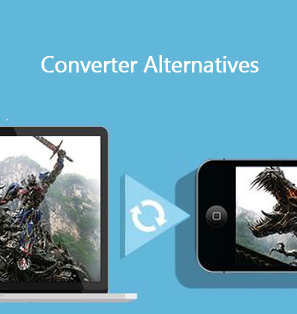"Which is better, NVR or DVR? I would like to purchase a video recorder but have no idea on what NVR and DVR are, and how to choose a proper one. What is the difference between NVR and DVR?"
If you're shopping around for a video surveillance system, you'll need to choose between the following 2 types of systems: NVR (Network Video Recorder) systems and DVR (Digital Video Recorder) systems. Both systems above perform the same function - they record video footage. They just differ in how they record the footage.
In this guide, we would like to make a brief introduction on what NVR and DVR are and how they differ from each other. You may know what to choose after reading this guide.
Menu
Part 1: Briefly Know about NVR and DVR
We need firstly get into NVR and DVR to know what they are before we may tell their differences.
What is NVR?
NVR stands for Network Video Recorder. NVR systems record and store video footage directly from the network it lives on using Cat5 or Cat6 Ethernet cables with RJ45 plugs. The NVR system is used with IP (Internet Protocol) cameras. These systems work with an advanced type of camera, called IP cameras. IP cameras can actually capture and process video and audio data themselves. They do so using either an ethernet cable or wirelessly via an existing WiFi network.
There are two types of network video recorders: The PoE NVRs, generally with Ethernet ports to connect PoE cameras, and the WiFi NVRs with NO camera ports because it connects WiFi IP cameras wirelessly.
- RJ45 port to connect PoE cameras
- eSATA port to connect external disk drives
- VGA & HDMI port to connect the monitor
- LAN port to connect the router
The network video recorder (NVR) saves the encoded videos from IP cameras from the network. That's to say, an NVR system needs no dedicated video processing hardware.
What is DVR?
DVR stands for Digital Video Recorder. These systems are considered the older "legacy" option. Unlike an NVR system, DVR systems work with analog cameras, which can't process video footage. Instead, the analog cameras stream raw video footage to recorders via coaxial cables. From there, the recorder processes the video footage.
- Coaxial port to connect analog cameras
- eSATA port to connect external disk drives
- VGA & HDMI port to connect the monitor
- LAN port to connect the router
By contrast, the digital video recorder (DVR) has a small chip inside to encode and process the analog videos into digital format first so that you can view and playback the recordings.
Both NVRs and DVRs are used for video recording and storage. Once the video is processed, both DVR and NVR systems work the same. After connecting to a smartphone or any other viewing device, you can easily access and view your video footage as needed.
Part 2: Comparison between NVR and DVR
NVR vs DVR sum-up: The biggest difference between NVR and DVR is the cameras and cabling they use. A network video recorder (NVR) records IP cameras wirelessly (WiFi NVR) or via Ethernet cables (PoE NVR), while a digital video recorder (DVR) records analog cameras via coaxial cables.
That's to say, the NVR is for IP camera recording and the DVR is for analog or coax-based camera recording.
The below table would show you the differences between NVR and DVR security system.
|
Comparison |
Full Form |
NVR/DVR Cameras |
Transmission Cables |
|
NVR |
Network Video Recorder |
IP (Internet Protocol) Cameras |
Ethernet Cables |
|
DVR |
Digital Video Recorder |
Analog & Coax Based Cameras |
Coax Cables |
Before we dig further into the difference between DVR and NVR, it could be good to know that both NVR and DVR security systems can work without the Internet connection!
If you want the NVR or DVR systems to record to a hard drive so you can look back when needed, the NVR or DVR CCTVs don't need to hook up with the Internet (no need to connect to your router). The DVR and NVR cameras will work on their own proprietary network once powered up.
The Internet is only needed if you want to view the DVR/NVR camera systems live off site or push alerts.
After learning what the NVR and DVR system is and their differences, let's explore the advantages and disadvantages of NVR and DVR, and you will then know which one suits you better. Check the table below for a quick comparison between the NVR recorder and DVR recorder:
| Comparison |
NVR (Network Video Recorder) |
DVR (Digital Video Recorder) |
|
NVR/DVR cameras |
IP cameras |
Analog or coax based cameras |
|
Recording quality |
Higher |
Lower |
|
NVR/DVR system setup |
Easier |
Tougher |
|
NVR/DVR camera cost |
Higher |
Lower |
NVR Systems
The network video recorders has already become the mainstream at this age of Internet, with more and more camera manufacturers and homeowners swap from producing and using DVRs to NVRS. And all these happened for big reasons. Check the following advantages of NVR systems:
1. NVR CCTV records higher quality videos: The network video recorders or NVRs are paired up with IP cameras, with a resolution starting from 2MP to 12MP (or higher), which is out of the question for analog cameras in a DVR security system.
|
Difference Between DVR and NVR in Resolution |
|
|
NVR System |
2MP, 4MP, 5MP, and 12MP (4K) systems are commonly seen |
|
DVR System |
720p, 2MP (1080p) are most popular |
2. NVR security system is easy to wire: The cabling work is definitely a headache in setting up an NVR or DVR system. Good news is that the NVR security system makes the cable work easy enough even for a beginner. The WiFi NVR visits cameras through the network wirelessly, so you don't need to worry about how to run wires to the network video recorder. The PoE (Power over Ethernet) NVR provides both power and network to the cameras via a single Ethernet cable. You may also use an PoE switch to make the long-distance wiring even easier.
3. NVR recorder is flexible in placement: The NVR uses IP network cameras. That's to say, you can place the NVR virtually anywhere as long as the network is available. By contrast, the DVR CCTVs are rather limited by the coax cable, with a max transmission distance of about 300 ft.
4. NVR systems are easy to use and configure: Thanks to the P2P NVR security cameras, you may set up the NVR system with literally ZERO configuration. You only need to download the network video recorder software, Reolink Client, for example, the IP cameras will automatically show up in the LAN network device list. Just add the cameras to the client with your password, the setup is done!
DVR Security Systems
Admittedly, the DVR (digital video recorder) has its price advantage, it seems to be less competitive these days with some obvious inconveniences.
1. Running cable is challenging for DVR systems: The hard wiring is the biggest disadvantage of DVR security cameras. First off, each camera will have two cables to deal with, one for power and one for audio and video. And it could be more difficult if your monitoring places are out of reach of the coax cable.
2. DVR CCTV systems deliver lower-quality videos: Even though emerging technology has greatly improved the recording quality of analog cameras, it still can not catch up with the NVR cameras. Some MPX (megapixel over coax) cameras could handle higher resolution, but they will cost you considerably, even more than NVR cameras.
3. The equipment needs to be closer in DVR security systems: The DVR IP cameras could be placed no more than 300 feet away from the DVR for the decaying signal over the coax cable.
4. DVR camera systems have a higher maintenance cost: As I mentioned, the DVR system transmits the signal via coax cable, which is much more vulnerable to the environments like the rain or strong wind with the pass of time. If they are exposed outside, you'll much likely to pay an extra bill in fixing the cable issues.
5. Digital video recorders have lots of potential issues to deal with: The DVR system, not to say it is outdated but it is definitely not something futuristic, gains decreasing market share every year. And that will lead to many potential problems you might have never thought of.
Part 3. All-inclusive DVR-MS Video Solution - Leawo Prof. Media
No matter you use NVR or DVR to record videos, you need some solution tools to help you further explore the DVR or NVR videos. Leawo Prof. Media is the all-inclusive DVR-MS video solution you may get. Actually, Leawo Prof. Media is an all-inclusive total media converter ultimate solution that offers you almost all media conversion solutions covering Blu-ray, DVD, video, audio, image and online videos.

Leawo Prof. Media
☉ Decrypt, rip and convert Blu-ray/DVD to video/audio files.
☉ Convert and burn videos files to Blu-ray/DVD content.
☉ Download videos from YouTube, Facebook, VEVO, and 1000+ other video sites.
☉ Edit Blu-ray/DVD/video files to trim, crop, adjust effect, apply 3D effect, etc.
☉ Remove Cinavia protection upon Blu-ray discs
☉ Play back various media files including Blu-ray, DVD, video, audio files.
With Leawo Prof. Media, you could actually easily turn DVR-MS videos to DVD/Blu-ray, convert DVR-MS videos to other file formats, edit DVR-MS videos, add 3D movie effect to DVR-MS videos, etc. As an all-inclusive media converter suite, Leawo Prof. Media could far more than simple DVR-MS video solutions for you. It could also:
- Play back Blu-ray, DVD, video, audio, and even ISO image files just like a region-free media player.
- Decrypt, rip and convert Blu-ray/DVD to video/audio files in 200+ file formats for various uses.
- Convert video and audio files between various formats for different media players and devices, supporting even 4K video output.
- Convert and burn videos files to Blu-ray/DVD content in disc, folder and/or ISO image file, and even burn image files to Blu-ray/DVD photo slideshow easily.
- Decrypt, copy and backup Blu-ray/DVD content to blank disc or computer hard drive, in full-movie or movie-only backup mode as you need.
- Remove Cinavia protection from Blu-ray to help you get Cinavia-free Blu-ray copies.
- Download videos from YouTube, Facebook, Veoh, VEVO, and 1000+ other video sites.
- Turn photos into photo slideshow video for saving in various formats, and edit generated photo slideshow.
- Edit Blu-ray/DVD/video files to trim, crop, add watermark, adjust effect, apply 3D effect, etc.
- Choose disc menu for DVD/Blu-ray burning, and even design disc menu with preferred items.
As a comprehensive media converter suite, Leawo Prof. Media could enable you to freely handle nearly all conversion solutions between Blu-ray, DVD, video, audio, image, ISO image file, and online video files for multiple uses.
Part 4. Conclusion
Both systems record video data and are reliable. Although in the past the video quality of DVR systems lagged behind comparable NVR systems, today this gap is significantly lessened. The difference between DVR and NVR systems come down to the cost, how the data is transmitted, and type of cameras. NVR systems tend to have better picture quality, as well as easier installation, increased flexibility, and native support for audio on every camera that has a microphone. However, NVR systems also tend to be quite a bit more expensive than comparable DVR systems, which is an important consideration for the budget conscious consumer. For people looking for a relatively straightforward security system, a DVR system will most likely be sufficient, especially if your property is already wired for a coaxial cable from an existing security system. If you need a top of the line, very flexible solution, an NVR based system will be best. At the end of the day, the deciding factor will be based on the specific security needs of your property.

